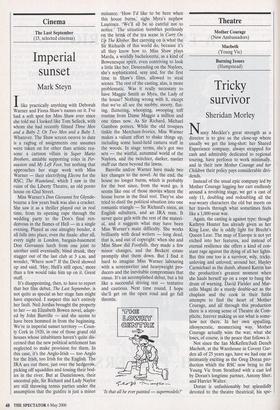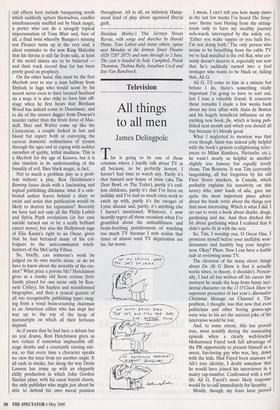Theatre
Mother Courage (New Ambassadors) Macbeth (Young Vic)
Burning Issues (Hampstead)
Tricky survivor
Sheridan Morley
Nancy Meckler's great strength as a director is to give us the close-up where usually we get the long-shot: her Shared Experience company, always strapped for cash and admirably dedicated to regional touring, have perforce to work minimally, and in their new Mother Courage and her Children their policy pays considerable divi- dends.
Instead of the usual epic company led by Mother Courage lugging her cart endlessly around a revolving stage, we get a cast of only 11, doubling and redoubling all the war-weary characters the old bat meets on her travels through what sometimes feels like a 1,000-year war.
Again, the casting is against type: though Kathryn Hunter has already given us her King Lear, she is oddly light for Brecht's Queen Lear. The map of Europe is not yet etched into her features, and instead of eternal resilience she offers a kind of con- stant rage against the dying of all her lights. But this one too is a survivor, wily, tricky, unloving and unloved; around her, Hayley Carmichael as the dumb, abused Katrin has the production's greatest moment when she hauls herself up on a rope to bang the drum of warning. David Fielder and Mar- cello Magni do a sturdy double-act as the chaplain and the cook in their futile attempts to find the heart of Mother Courage, and all through this production there is a strong sense of Theatre de Com- plicite, forever making us see what is some- how not there. In her own appalling, idiosyncratic, mesmerising way, Mother Courage actually wins the war; what she loses, of course, is the peace that follows it.
Not since the Ian McKellen/Judi Dench Macbeth, at the Warehouse in Covent Gar- den all of 25 years ago, have we had one as intimately exciting as the Greg Doran pro- duction which the RSC now bring to the Young Vic from Stratford with a cast led by Doran's longtime partner, Antony Sher, and Harriet Walter.
Doran is unfashionably but splendidly devoted to the theatre theatrical; his spe- cial effects here include banqueting stools which suddenly upturn themselves, candles simultaneously snuffed out by black magic, a porter who can do a savagely topical impersonation of Tony Blair and, best of all, a final twist whereby Banquo's missing son Fleance turns up at the very end, a silent reminder to the new King Malcolm that his throne is still far from safe, at least if the weird sisters are to be believed and their track record thus far has been pretty good on prophecy.
On the other hand, this must be the first Macbeth ever to star a man halfway from Shylock to Iago who would seem by his accent never even to have located Scotland on a map; it is also risky to have him off- stage when he first hears that Birnham Wood has indeed come to Dunsinane, and to die of the unseen dagger from Duncan's murder rather than the brute force of Mac- duff. Sher and Walter come up like the Ceaucescus, a couple locked in lust and blood but expert both at conveying the curious domestic ordinariness of tyrants through the ages and at coping with sudden onrushes of quirky, lethal madness. This is a Macbeth for the age of Kosovo, but it is also timeless in its understanding of the banality of evil. Sher black magic, in fact.
Not so much a problem play as a prob- lem without a play, Ron Hutchinson's Burning Issues deals with a fascinating and topical publishing dilemma: what if a cele- brated author leaves behind a diary so racist and sexist that publication would be likely to destroy his reputation? Recently we have had not only all the Philip Larkin and Sylvia Plath revelations (in her case suicide turned out to be a really brilliant career move), but also the Hollywood saga of Elia Kazan's right to an Oscar, given that he had betrayed many of his col- leagues to the anti-communist witch- hunters of the McCarthy Fifties.
So, briefly, can someone's work be judged on its own merits alone, or do we have to know about the morality of the cre- ator? What price a private life? Hutchinson gives us a cranky old Scots recluse (bril- liantly played for one scene only by Ken- neth Colley), his hapless and misinformed biographer, and then a cynical quartet of all too recognisable publishing types rang- ing from a venal bean-counting chairman to an American editor who has slept her way up to the top of the heap of manuscripts on which all their fortunes depend.
As if aware that he had here a debate but no real drama, Ron Hutchinson gives us two violent if somewhat implausible off- stage deaths and a constantly turning mir- ror, so that every time a character speaks we view the issue from yet another angle. It all ends in smoke, but along the way Denis Lawson has come up with an elegantly chilly production in which John Gordon Sinclair plays, with his usual boyish charm, the only publisher who might just about be able to defend his own moral position throughout. All in all, an infinitely Hamp- stead kind of play about agonised liberal guilt.
Sheridan Morley's The Jermyn Street Revue, with songs and sketches by Harold Pinter, Tom Lehrer and many others, opens next Monday at the Jermyn Street Theatre (020 7287 2875) and runs through to 2 June. The cast is headed by Judy Campbell, Frank Thornton, Thelma Ruby, Jonathan Cecil and Issy Van Randwyck.



































































 Previous page
Previous page